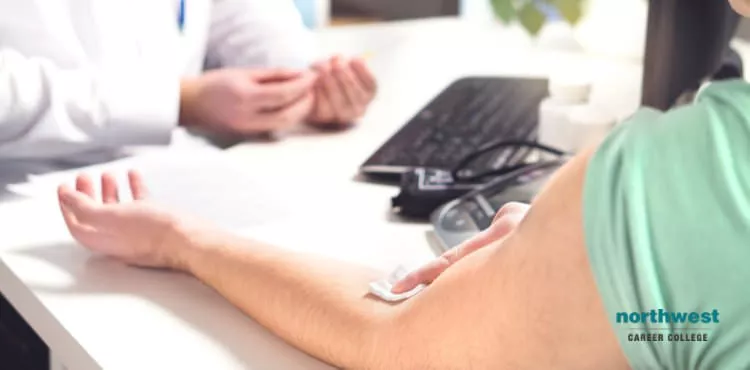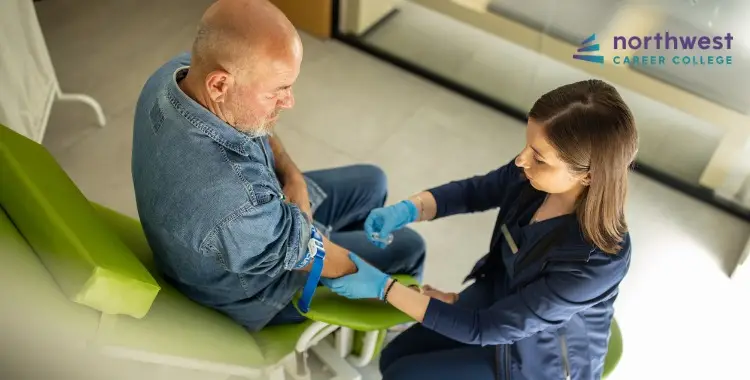Making Blood Draws Part Of Patient-Centered Care
- Phlebotomy Technician
- March 11, 2024
- 3.6k views
- 4 min read

Blood draws are the most common invasive medical procedure in hospitals worldwide, with roughly 760 inpatient draws bring conducted every minute in the United States alone. In addition to being a hugely common procedure, blood draws are also a vital one. While difficult to exactly quantify, a commonly stated statistic is that laboratory results contribute to nearly 70% of all clinical decision-making.
Because of the ubiquity of blood draws as a standard component of healthcare delivery, and its invasive nature, blood draws represent an ideal area in which to innovate and focus on patient-centered healthcare.
Table of Contents
What Are The Problems?
A 2016 survey of thirty one hospitals, across four distinct U.S. health systems, showed that repeat inpatient blood drawing was extremely common. 22% of patients received two or more draws per day during their admission, while a further 16% endured 10 or more draws during their hospital stay. While this might seem like an extraordinary number of invasive procedures to undergo, the data is consistent with previous surveys which suggested that 30% of non-emergency patients receive 10 or more blood draws during admission followed by an average of at least 1.5 draws per day during their entire admission.
The same surveys revealed that these hugely frequent blood draws have a significant psychological impact on patients. Around 10% of the population is affected by trypanophobia, a deep-seated fear of needles, and even those not phobic about the procedure are often unhappy with the idea of repeated invasive procedures. This situation is exacerbated by the fact that blood drawing often does not work on the first attempts. A 2009 survey by Frost and Sullivan revealed that nearly 28% of venipunctures required more than one attempt.
This worrying trend only increases when the patient is a child. 44% of attempts to draw blood from children fail and 43% require three or more attempts, while 16% require needle probing, or “fishing,” to gain access to a vein.
How Does This Affect The Phlebotomist?
In addition to the effect repeated blood drawing has on patients, there is the often overlooked impact that is has on those tasked with drawing the blood. There are around 200 needle-related injuries to staff members across US healthcare providers every day, with one report showing that 70% of nurses working across 60 hospitals had experienced at least one needle-stick injury. Treating these injuries, and the associated safeguard testing that follows that treatment, is estimated to cost $5,000 per incident – or upwards of $50 million per year.
Added to the physical risk, the emotional trauma of subjecting patients to repeated and invasive procedures that inspire feelings of dread and anxiety has psychological effect on the caregiver. Those in the healthcare system are emotionally invested in the wellbeing of their patients, both physically and emotionally, and experience a negative emotional reaction when drawing blood causes that patient pain or distress.
Moving Towards Patient-Centered Care
Given the frequency and ubiquity of blood drawing in the US healthcare system, it represents a significant area in which a change towards a more patient-centered approach could have significant benefits for both patients and phlebotomists. Recent advances in technology have made this transition far more practical, including a single-use, disposable device that attaches to a peripheral IV line and allows for needle-free blood draws and vein visualization devices that help phlebotomists find their patient veins using infrared technology.
There are also call for more focus to be placed on techniques to alleviate the stress of repeated blood draws, such as relaxing music, artwork or even gentle massage before or during the draw. Current research is being done into positive effect of having counselors at the point of care to deliver relaxation techniques and enhanced treatment for children and those suffering from trypanophobia.
At Northwest Career College, we pride ourselves on providing one of the premier Phlebotomy Schools in Las Vegas. Our phlebotomy students have an 89% national exam pass rate and you can graduate in as little as three months. Our established, seasoned instructors will take you through every aspect of Phlebotomy and Northwest offers day, afternoon and night classes to accommodate your busy Las Vegas work and family schedule. Call us today at (702) 403-1592 to speak to one of our admissions specialists about your new Phlebotomy career.



